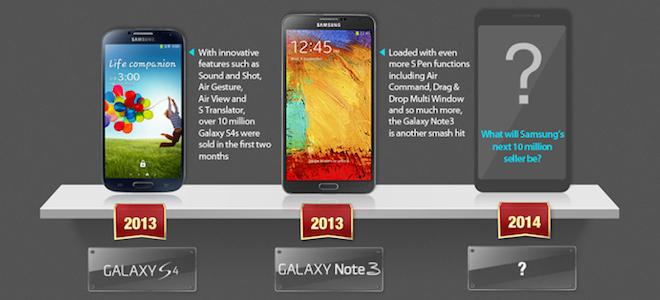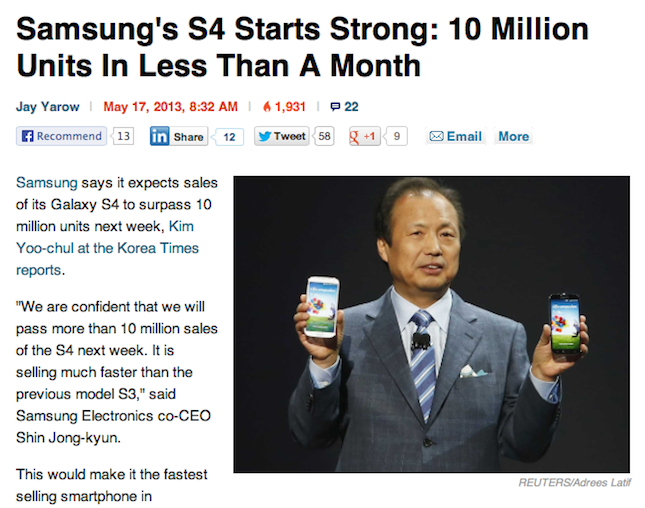Samsung has always been cagy about releasing data on the devices it sells, but it just provided a new clue that indicates "phablet" models are not nearly as popular as is commonly believed, again explaining why Apple hasn't been in a rush to sell a big screen iPhone.

The company's promotional blog Samsung Tomorrow announced having shipped 10 million Galaxy Note 3 phablets in a roundabout fashion using an infographic to compare the Note 3 against other devices that had also reached the 10 million mark.
All three generations of the Galaxy Note and all four Galaxy S models have reached sales of 10 million units, but Samsung's latest Note 3 has only been on sale for two months.
That channel shipments milestone is less impressive when compared against Apple's launch sales of the iPhone 5s/5c, which hit 9 million sales in a weekend.
However, it's also only half as fast as the 10 million units "shipped in one month" pace that Samsung expected for the Galaxy S4 back in May.

That's particularly notable because the Galaxy S4 has continued to sell far short of initial expectations. In November, at an investor conference intended to assuage the concerns of its investors, a Samsung executive outlined that the company expected to ship a combined total of 100 million premium handsets in its Galaxy S and Note lines.
That figure revealed the first solid proof that the majority of Samsung's "smartphone sales" this year were actually very low end devices, because it means only one third of the company's overall shipments are premium phones that could be compared to an iPhone.
Samsung's numbers revealing that its big screen Note 3 phablet will account for only a tenth of one third of its 2013 smartphone sales also highlights that oversized phones are not nearly as popular as is often assumed. The majority of Samsung's Note phablets sell in Asia, primarily within South Korea itself. Half of the Note 3's current shipments had occured by then end of October.
5 mil Note 3's shipped in first month. Likely mostly in Asia and MOST in S. Korea. http://t.co/ytGGv6erhO
-- Ben Bajarin (@BenBajarin) October 30, 2013
Subsequent numbers by IDC have similarly indicated that big screen phones account for a similar minority of overall sales, underscoring why Apple hasn't rushed to join Android phone makers in releasing big phones.
IDC defined "phablets" as phones with screens as small as 5 inches, which would also include the Galaxy S4. In total, the research company stated that Android's premium phones made up just 21 percent of the "smartphone" market, indicating that the remaining 66 percent of Android devices are very low end products with an Average Selling Price of just $214.50.
Apple selling more premium phones than Samsung
In its fiscal 2013 ending in September, Apple announced sales of 150 million iPhones, mostly iPhone 5 models, as well as 71 million iPads, a total of over 221 million premium smartphones and tablets.
Outside of tablet-phone hybrids like the Note, Samsung sells relatively few standalone tablets, liberally giving away such devices with other purchases of TVs and other products. The company doesn't release quarterly tablet sales.
Another reality highlighted in the company's infographic is the the radical shift the company made in 2009 when began efforts to clone the iPhone. Prior to that year, the only phones sold by the company that reached into 10 million units were simple flip phones or button-oriented candy bar models running Symbian.
Immediately after the "crisis of design" that leaked during the Apple vs Samsung trial last year, all of Samsung's subsequent phones appear to be copies of Apple's large touch screen iPhone concept.
Outside of Samsung, other large Android licensees are doing even worse in their attempts to sell premium phones. The HTC One turned out to be a tremendous disappointment for the company despite garnering more positive reviews than Samsung's phones.
Android Beat relayed news from the Korean language Asia Today this week that pegged quarterly sales of LG's flagship G2 at just 2.3 million units, short of the company's goal of 3 million units despite a prominent ad campaign focusing on the devices' rear fingertip controller.

-xl-s.jpg)
